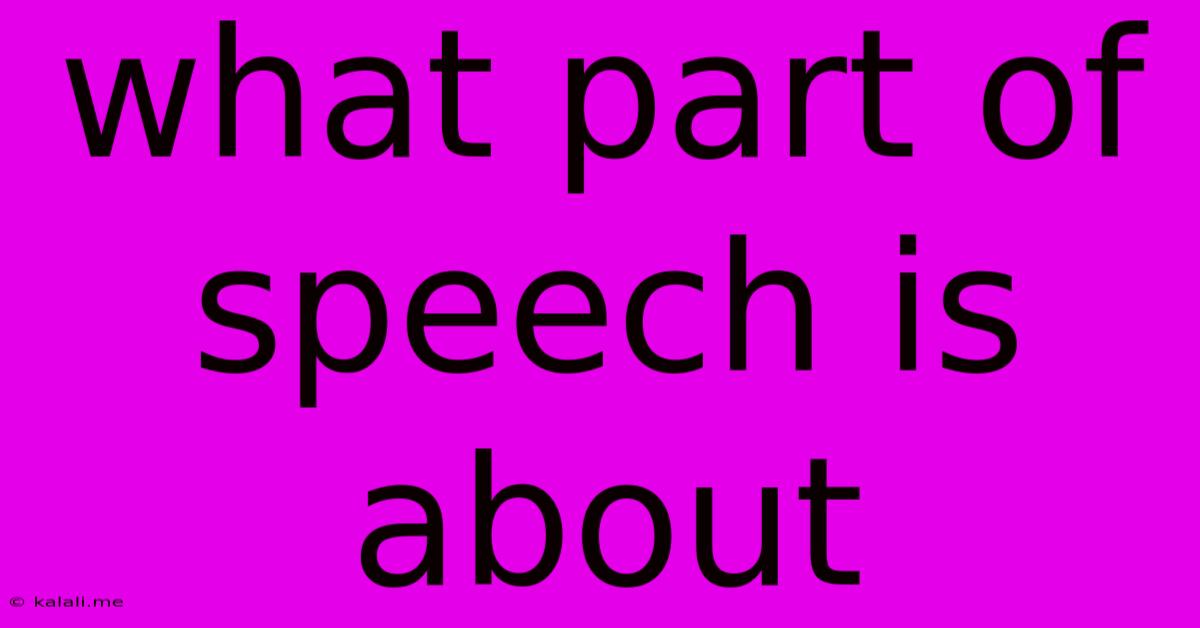What Part Of Speech Is About
Kalali
Jun 07, 2025 · 3 min read

Table of Contents
What Part of Speech Is "About"?
The word "about" is a versatile word in the English language, functioning primarily as a preposition, but also capable of acting as an adverb. Understanding its grammatical role is crucial for clear and effective writing. This article will delve into the different ways "about" is used, exploring its function in various sentence structures and providing examples to solidify your understanding.
About as a Preposition:
In its most common usage, "about" acts as a preposition. PreAA preposition shows the relationship between a noun or pronoun (its object) and another word in the sentence. When used as a preposition, "about" indicates:
-
Topic or Subject: This is the most frequent use. It introduces the subject or topic of a conversation, thought, or writing.
- Example: "We talked about the weather." (The preposition "about" links "talked" to "weather," showing that the weather was the topic of conversation.)
- Example: The book is about the history of sailing. (Here, "about" shows that the book's subject is the history of sailing.)
-
Approximation or Proximity: "About" can also express an approximate amount, time, or location.
- Example: "There were about twenty people at the party." (This signifies an approximate number, not an exact count.)
- Example: "The meeting will start about noon." (This indicates an approximate time.)
- Example: "The store is about a mile from here." (This suggests an approximate distance.)
-
Concerning or Regarding: "About" can indicate that something relates to or concerns a particular person or thing.
- Example: "I have some concerns about the project's timeline." ("About" connects "concerns" and "timeline," showing what the concerns pertain to.)
About as an Adverb:
Less frequently, "about" functions as an adverb. An adverb modifies a verb, adjective, or another adverb, indicating manner, time, place, or degree. As an adverb, "about" typically means:
-
Approaching or Nearby: In this context, it suggests nearness in time or location.
- Example: "The train is about to arrive." (Here, "about" modifies the verb "to arrive," indicating the imminence of the arrival.)
- Example: "He's about to leave." (Similar to the example above, "about" indicates nearness in time to the action.)
Distinguishing Between Preposition and Adverb "About":
The key to distinguishing between the prepositional and adverbial uses of "about" lies in its function within the sentence. If it connects a noun or pronoun to another word, it's a preposition. If it modifies a verb, it's an adverb.
-
Testing for Prepositional "About": You can often replace "about" with other prepositions like "concerning," "regarding," "regarding," "near," or "approximately" without significantly altering the sentence's meaning.
-
Testing for Adverbial "About": The adverbial "about" often implies imminent action and can't be easily replaced by other words.
In Conclusion:
The word "about" is a multifaceted word, primarily serving as a preposition to indicate a topic, approximation, or relationship, but occasionally operating as an adverb signifying nearness in time. Understanding its various functions is critical for precise and grammatically correct writing. By carefully considering the context and function within the sentence, you can confidently identify whether "about" is a preposition or an adverb.
Latest Posts
Latest Posts
-
Offering A Hand Step Out Of Carrage Victorian Style Pose
Jun 07, 2025
-
Gta 5 Best Story Mode Cars
Jun 07, 2025
-
Why Do Cats Lick Your Hand
Jun 07, 2025
-
What Food Do Muslims Not Eat
Jun 07, 2025
-
Internal Temp Of Pork Tenderloin When Done
Jun 07, 2025
Related Post
Thank you for visiting our website which covers about What Part Of Speech Is About . We hope the information provided has been useful to you. Feel free to contact us if you have any questions or need further assistance. See you next time and don't miss to bookmark.